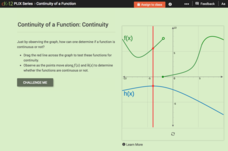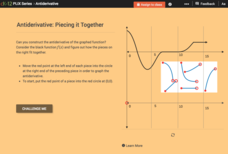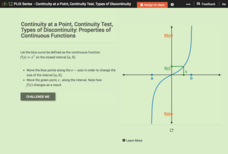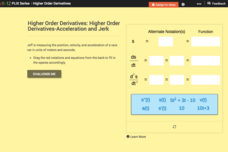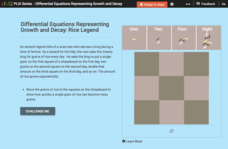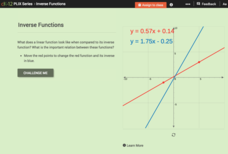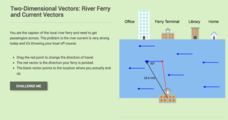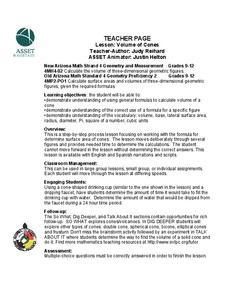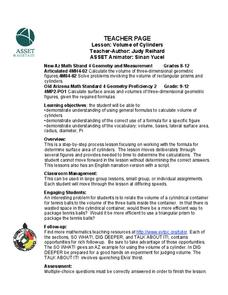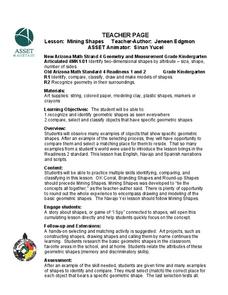CK-12 Foundation
Two-Sided Stem-and-Lead Plots: Gamers
Which gender spends more time playing video games? Your classes use provided data to answer this question. They first build a two-sided stem-and-leaf plot and then use the display to look for patterns. Guiding questions help them...
CK-12 Foundation
Continuity of a Function: Continuity
Does the point continually move along the graph? Pupils drag a line across two functions to determine whether they are continuous or not. They answer questions about the properties of continuous and discontinuous functions. Using their...
CK-12 Foundation
Antiderivative: Piecing it Together
Build a function backwards. Given a graph of the derivative of a function, pupils piece together a graph of the original function, the antiderivative. Learners use their graphs and the graphs of the derivatives to answer questions about...
CK-12 Foundation
Continuity at a Point, Continuity Test, Types of Discontinuity: Properties of Continuous Functions
Take a closer look at continuous functions within given intervals. Using the parent cubic function, learners explore properties of continuous functions on intervals. Pupils interpret the Intermediate Value Theorem and the Extreme Value...
CK-12 Foundation
Higher Order Derivatives—Acceleration and Jerk
Accelerate your class through finding the second derivative. Using a bank of equations, pupils determine the equations for distance, velocity, and acceleration and their associated function notations. With the equations, learners answer...
CK-12 Foundation
Differential Equations Representing Growth and Decay: Rice Legend
The legend of a wise man who asks a king for rice as a reward presents a context to study exponential solutions to differential equations. Pupils move quantities of rice to a chessboard and calculate the amount of rice for each day. To...
CK-12 Foundation
Inverse Functions
Provide a graphical view of inverses. Pupils manipulate points on a line and see the relationship of the graph with the graph of its inverse. Using the relationship between the graphs, scholars respond to questions concerning inverses...
CK-12 Foundation
Explicit Formulas: Tiles for Writing nth Term in a Sequence
Build an explicit formula using tiles. Pupils develop a tile representation of a term within a sequence given figures of previous terms. Using the diagrams, learners develop the explicit formula by recognizing the common difference and...
CK-12 Foundation
Two-Dimensional Vectors: River Ferry and Current Vectors
Fight against the current. Pupils explore the resulting path when they are crossing a river while being pushed downstream by the current. Using vector notation, learners express the speed and direction of a ferry. They finish by...
Curated OER
Geometry Lesson 7: Line Segments And Angles
Fourth graders examine and identify line segments and angles using dot paper to draw them. They look at vertical, horizontal, intersecting, parallel and perpendicular lines, draw right angles and angles that are greater than and less...
Curated OER
Exploring Transformations with Matrices
A page right out of the Holt Geometry book. Use a graphing calculator and graph paper to explore transformations with matrices.
Futures Channel
Folding Circles
Students investigate properties of circles. In this geometry lesson, students differentiate between similarity and congruence as they observe polygons. They investigate properties of two and three dimensional shape.
Curated OER
Symmetry of Road Signs
Young scholars identify symmetry in road signs. In this geometry lesson, students explore objects in the real world for symmetry. They perform translation, rotation and reflection.
Curated OER
Navajo Rug
Navajo art incorporates many fascinating shapes and designs. In this shapes lesson, students explore how shapes may be combined to create art and architecture. They also discover shapes in the world around them.
Curated OER
Volume of Cones
Students identify the volume of cones and pyramids. In this geometry lesson, students derive the formula for cones and pyramids. They calculate the volume of cones and other three dimensional shapes.
Curated OER
Volume of Cylinders
Middle and high schoolers calculate the volume of cylinders. In this geometry lesson, learners differentiate between rectangular prisms and cylinders. They use the correct formula to solve for each solid.
Curated OER
Hypatia: Angles
Introduce your young geometers to Hypatia, the first noted Greek female mathematician, and the properties of angles. Though this resource is missing worksheets that are needed to complete the lesson plan, the structure is sound and...
Curated OER
Symmetrical Snowflakes
First graders, exploring lines of symmetry, follow directions to create a symmetrical snowflake from their own homemade icing. As a class, they discuss lines of symmetry and determine if specific shapes are symmetrical. After the lesson,...
Curated OER
Circles 1, 2, 3, 4
Here is a way to help your charges identify circles and spheres. In this shapes geometry and technology lesson, students identify and draw circles and explain the related attributes. They recognize circles and spheres while exploring...
Arizona State University
Mining Shapes
Youngsters recognize and identify shapes. They draw, and use modeling clay to make shapes. They also identify shapes in their environment and in the Navajo culture, then compare the shapes and sort them into groups. This is the...
Curated OER
Moving Day!
Eighth graders continue their geometry unit by focusing on volume. Using data, they create a spreadsheet, estimate and calculate volume. They solve real-life problems and round their answers to the hundredths place. They also practice...
Curated OER
3-D Cubes
Young scholars investigate cubes. In this geometric solids instructional activity, students review geometric concepts previously taught, then logon to a computer game in which they find cube figures and identify the shadow of hidden cubes.
Arizona State University
Roundup Shapes
Let's study 2-D shapes! Young mathematicians compare and classify shapes according to attributes. They evaluate shape riddles and predict the shape being described. Here is the website where you can find the lesson...
Curated OER
Graph Paper Patterns
Young artists divide a piece of graph paper into sections using rectangles, squares, and triangles. They then fill each section with patterns of shape and color. Elementary graders describe how their patterns are organized. Secondary...
Other popular searches
- Math Art Geometry Lessons
- Math Geometry Lessons
- Esl Lessons Math Geometry
- Esol Lessons Math Geometry
- Mummy Math Geometry Lesson
- Math Geometry Lesson Plans



